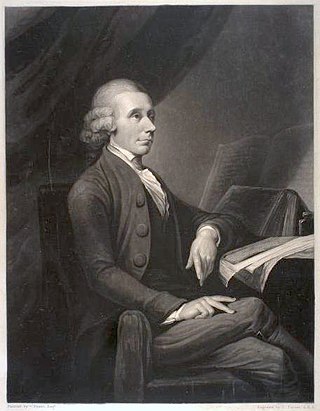Related Research Articles

Joshua Brookes was a British anatomist and naturalist.
Junius was the pseudonym of a writer who contributed a series of political letters critical of the government of King George III to the Public Advertiser, from 21 January 1769 to 21 January 1772 as well as several other London newspapers such as the London Evening Post.
Samuel Cobb was an English poet, critic and school master who was known for a light hearted, ironic pose in his verse and a witty, good natured personal life.

The Theological Repository was a periodical founded and edited from 1769 to 1771 by the eighteenth-century British polymath Joseph Priestley. Although ostensibly committed to the open and rational inquiry of theological questions, the journal became a mouthpiece for Dissenting, particularly Unitarian and Arian, doctrines.
The Lady Margaret Professorship of Divinity is a senior professorship in Christ Church of the University of Oxford. The professorship was founded from the benefaction of Lady Margaret Beaufort (1443–1509), mother of Henry VII. Its holders were all priests until 2015, when Carol Harrison, a lay theologian, was appointed to the chair.
Sir Thomas Abney was an English barrister and later judge. He was baptized at Willesley, Derbyshire on 30 April 1691 and was the younger son of Sir Edward Abney, by his second wife, Judith, daughter and co-heir of Peter Barr, of London.
Mary Chandler (1687–1745) was an English poet. George Crabb writes that she left several poems, "the most esteemed of which was her Bath."

The First Secession was an exodus of ministers and members from the Church of Scotland in 1733. Those who took part formed the Associate Presbytery and later the United Secession Church. They were often referred to as Seceders.
John Bowden was an English Presbyterian minister.
Thomas Campbell (1733–1795) was an Irish Protestant clergyman, best known as a travel writer and for his accounts of the circle of Samuel Johnson.
John Calder D.D. (1733–1815) was a Scottish dissenting minister and author.

Sir William Calderwood, Lord Polton (1660?–1733) was a Scottish lord of session.
John Bonar (1721–1761) was a Church of Scotland minister.
Andrew Cantwell was an Irish academic in France and medical writer, known as an opponent of inoculation.
Thomas Bell (1733–1802) was a Scottish minister, known as a theologian and translator.

Thomas Boston, the younger (1713–1767) was a Scottish minister of the Relief Church.
Samuel Humphreys (c.1697–1738) was an English poet, librettist and translator. He is known for the words he wrote for Handel's oratorios Esther (1732), Deborah (1733), and Athalia (1733).
Knightly Chetwood was an Anglican priest, poet, and translator.
References
- Stephen, Leslie, ed. (1886). . Dictionary of National Biography . Vol. 6. London: Smith, Elder & Co.
Attribution
![]() This article incorporates text from a publication now in the public domain : Stephen, Leslie, ed. (1886). "Bowden, Samuel". Dictionary of National Biography . Vol. 6. London: Smith, Elder & Co.
This article incorporates text from a publication now in the public domain : Stephen, Leslie, ed. (1886). "Bowden, Samuel". Dictionary of National Biography . Vol. 6. London: Smith, Elder & Co.